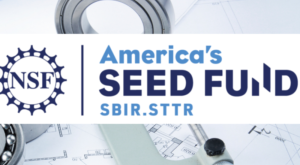Megan Varnum, Sr. Principal Consultant at BBCetc, presented on the ins and outs of NSF SBIR/STTR Proposals to a group of 40+ innovators at Memorial Union on March 13. The innovators, although at various stages of commercialization and SBIR preparedness, all benefited from the extensive experience sharing and networking in the three primary sessions.
Varnum first covered the basics of SBIR/STTR and gave an overview of the NSF program. She highlighted that all SBIRs, from eleven different agencies, are all created differently. She noted that there are primarily three phases, the third of which is commercialization, and that the best team is a well-defined team with appropriate levels of effort.
When it comes to NSF, Varnum hit home that NSF funds revolutionary, not evolutionary, technology. Technology must have the following to be considered for NSF SBIR/STTR:
- Significant, technical R&D
- Unique and defensible technical innovation
- Aggressive, focused commercialization
- Significant understanding of market and customer
During session two, Varnum described the process of NSF SBIR Phase I submission. NSF has submission windows; a review starts after the windows close. The first part of an NSF submission is the project pitch which must include, in brief explanations, the:
- Technological Innovation
- Technical Objectives and Challenges
- Market Opportunity
- Company and Team
Additionally, letters of support are key to proposal acceptance. These letters must be from an external perspective. They often promise to become a partner or customer if funded. Varnum gave more key tips about getting these letters at an early stage.
Session three was an in-depth discussion into the specifics of each section of an NSF Phase I proposal and the challenges and opportunities innovators may face.
The day ended with a series of one-on-one sessions in which innovators planning to submit in 2024 were able to chat with Varnum and CTC’s Senior SBIR Consultant, Todd Strother.
The CTC, housed in the Universities of Wisconsin’s Institute for Business and Entrepreneurship, assists small businesses and researchers prepare to apply for the federal SBIR/STTR program. Offering events, programs, partnerships, and grant funding, CTC is one of Wisconsin’s key free resources for innovation funding.
Contact CTC today to see if you are eligible for up to $4500 in grant funds to help prepare a Phase 1 proposal.

